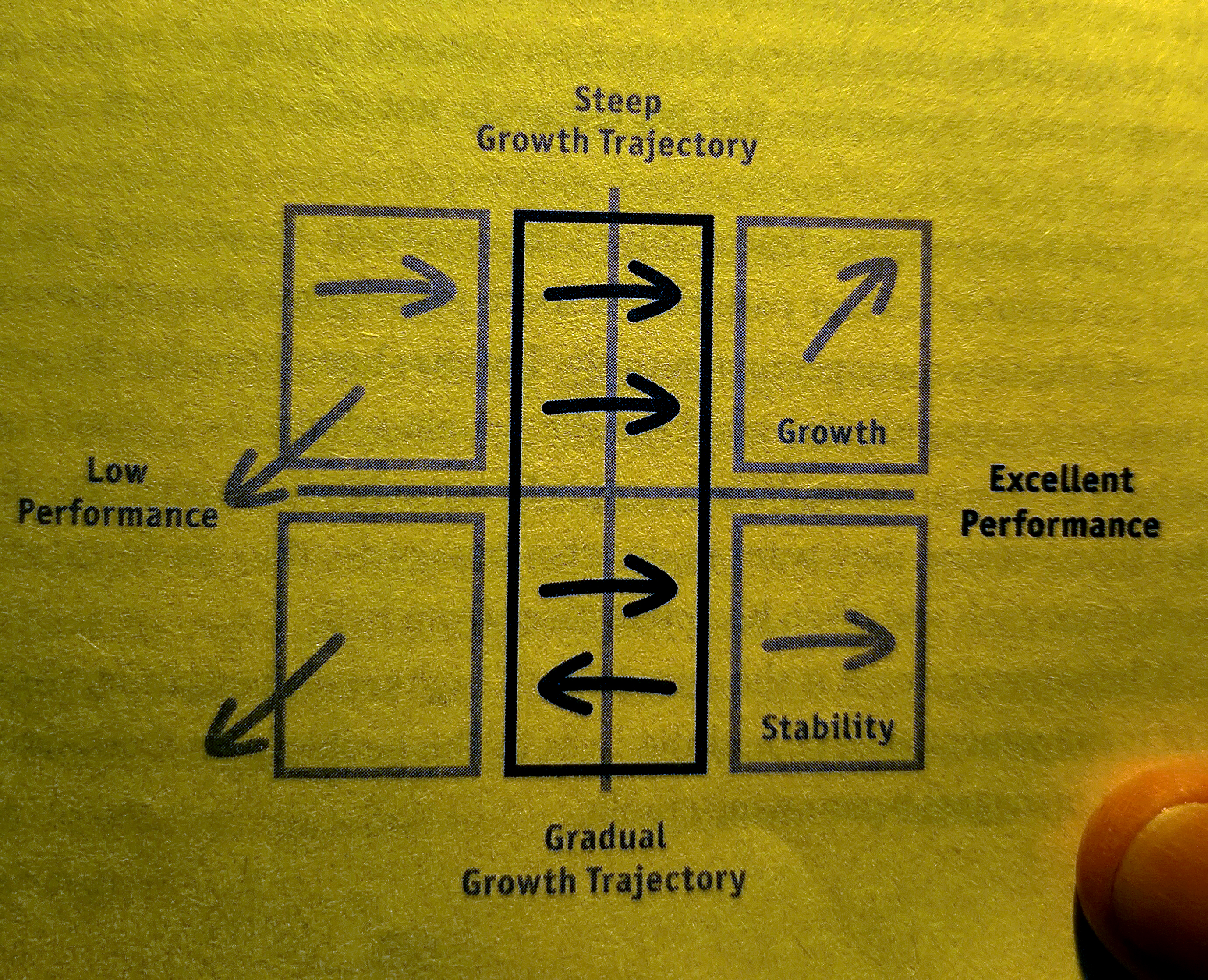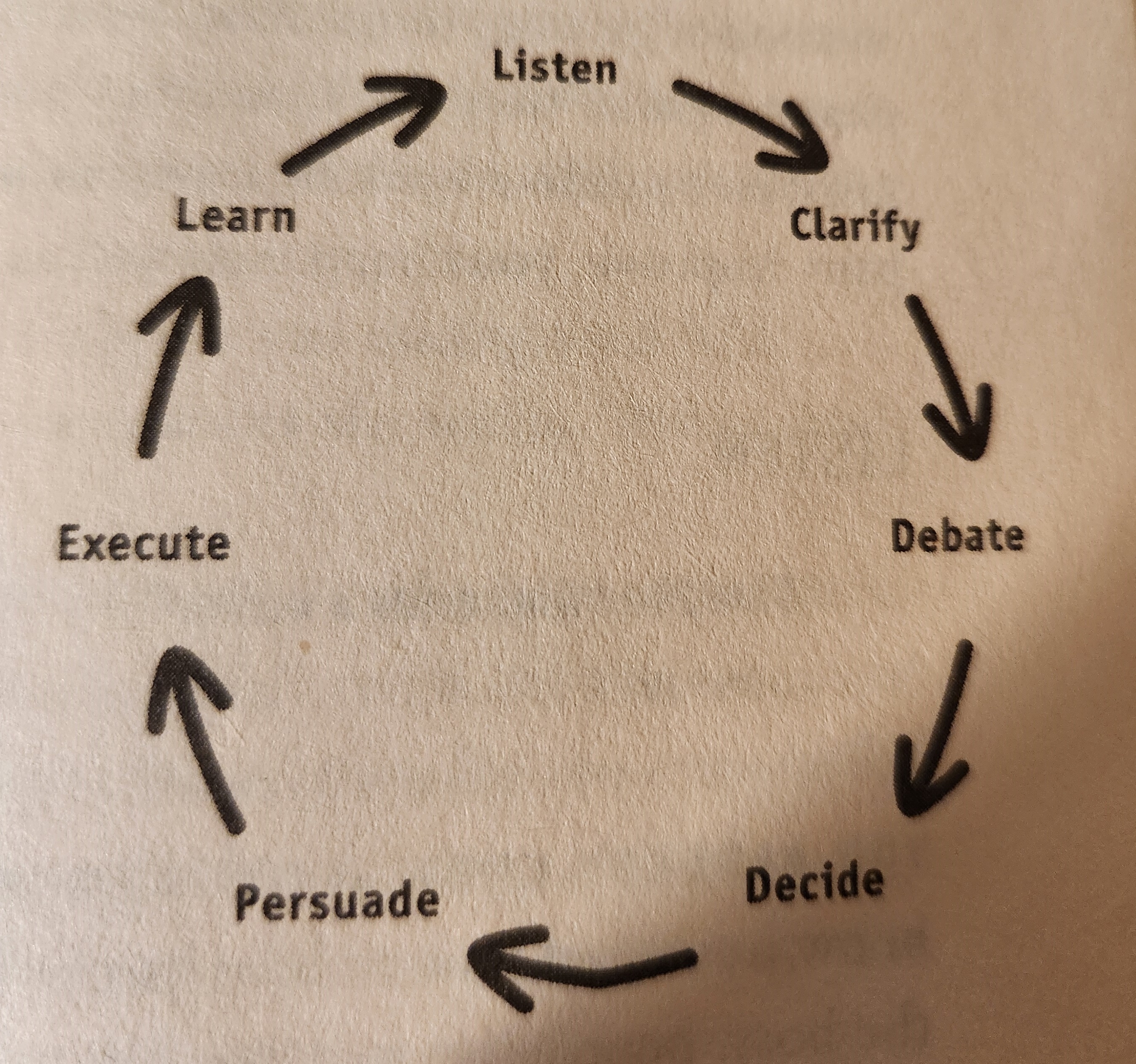This book was aimed more at managers than I expected. I found myself agreeing with about 30% of this book, vehemently disagreeing with about 10% of it, and confused by about 20% of it. The rest didn't leave a strong impression.
Takeaways
If you don't tell people they aren't delivering quality, it spirals out of control.
How much research do you do before praising someone? Do the same amount you'd do before criticizing them.
Care personally — beyond the job. Challenge directly. Say when work isn't good enough (and when it is). Be upfront when you're promoting someone over them, etc.
You have to care about the whole person, not just their output.
We are human beings. To suppress our feelings in the name of professionalism is to alienate ourselves from our labor, to resent going to work.
You need to be comfortable being yourself at work.
Challenge directly shows that you care enough to point out what isn't going well (and what is) and that you're willing to admit and fix mistakes (yours or others)
If no one is ever mad at you, you probably aren't challenging your team enough (?)
Handle the anger. Acknowledge the pain your words cause. Never say "don't take it personally", just show you care. Offer to help fix the problem.
Invite people to challenge you as well.
Radical candor is not being a jerk. The caring is essential. Neither is it nitpicking.
Rule of thumb for any relationship: leave three important things unsaid every day (?)
Other failure states; obnoxious aggression (being a dick without showing you care), ruinous empathy (being nice and insincerely praising), manipulative insincerity (saying what they want to hear to avoid conflict).
Start by asking for feedback and criticism.
Don't personalize it. "You've been working weekends and it's starting to take a toll on your ability to catch mistakes" vs "you're sloppy".
Two different types of employees (later clarified that some fall outside of either camp, and are not performing well): Rock stars, who are stable and steady performers not looking for growth, and superstars, who are ambitious, growing, and looking to spread wings, possibly beyond your team. They are both valuable (rock stars are essential), but have different needs. Make sure not to neglect rock stars when performance season comes around.
Using a check minus, check, check plus system is clear: is this a solid quarter, an off quarter, or a stellar quarter?
There are a number of charts used throughout this book that I found baffling, and without enough information. This one I finally understood after the fifth time seeing it, but there were many others that never became clear to me.

You can't tell people what to do, you need to be collaborative.
She once fired a guy after pretending everything was okay. He knew his quality wasn't there, and put off saying anything. Everyone else noticed and it infected the team. When she finally fired him, he asked "Why didn't anyone tell me?"
⭐ "If you want to build a ship, don't drum up people to collect wood and assign them tasks and work, but rather team them to long for the endless immensity of the sea."
How to get everyone on the same page? The GSD wheel.
⭐ Quiet listening vs loud listening — strong opinions weakly held. "Please poke holes in this idea."

Clarity
There's no point in debating a half-baked idea, and you certainly can't implement it.
Chip away at all that isn't essential. Consider the audience — Grandma cares about personal impact, boss cares about revenue, peers care about the technical aspects.
Debate
A rock tumbler that polishes up stones.
Focus on facts. Don't allow people to attribute ownership to ideas. Not my idea, not me winning. Just looking for the best idea.
She kept using the phrase "push facts to decisions and pull decisions into facts." I never understood what she meant by this.
Don't worry about what people not in the room might think or feel. The goal is to get the best answer. Persuading others comes later.
Ask people to switch roles. If they are arguing for A, ask them to argue for B. It's about getting the ego out of the way. If it's going to be long, warn people ahead of time that you'll ask them to switch roles — this leads to more attentive listening.
Can use Obligation of Dissent — if everyone agrees, it's a red flag. Be aware of the mood, tone of debate meetings.
⭐ Be clear the different between debate meetings and decision meetings. Or have a "decide by" date next to each item being detailed.
Debate is also good to polish ideas before presenting them to big brass / shark tank situations. Know your audience and how to persuade them.
Culture is bigger than just you, and spreads broadly.
Say "I think that's wrong" instead of "I think you're wrong". It's softer and focuses on the issue, not the ego.
Listen, challenge, commit.
Have the humility to listen, the confidence to challenge, and the wisdom to know when to quit arguing and get on board.
Implement fix-it weeks where the only goal is to solve bugs.
Have an "Orange box" where anonymous suggestions can feedback can be left.
Whoops the Monkey, Killer whale. Nominate someone else for the whale for the week / month. They get the stuffed animal. Nominate yourself for Whoops The Monkey for a screwup. Learn to minimize the fallout AND repetition of these mistakes by sharing them.
FDR met with John Maynard Keynes. Economists believe that if FDR had unde4rstood what Keynes was saying, the Great Depression could have ended sooner. Whose fault is it that FDR didn't understand? People traditionally blame FDR, but it was Keynes's job to express himself clearly.
Block 2 hours of sacred think time every day. Get "really seriously angry" if anyone tries to schedule over it (?)

It's not clear to me what the author's expected outcome from this interaction was.